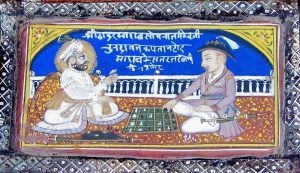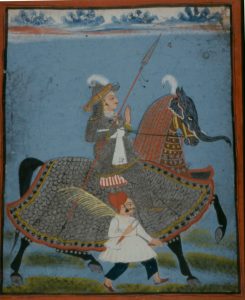A Blog from Henry Colebrooke
This week, we have a guest blogger. Written in the voice of Henry Colebrooke, the Royal Asiatic Society’s founder in 1823, we learn of a new project, one of the ways in which the Society’s will celebrate its bicentenary in 2023.
In anticipation of the Royal Asiatic Society’s bicentenary, the Society has asked a team of scholars to prepare a new edition of James Tod’s Annals and Antiquities of Rajast’han complete with introduction and annotations. In addition to restoring the text to its original first edition state, the editors will prepare a companion volume that will provide critical interpretive apparatus and contextual frames to aid in reading this iconic text. The Society’s re-issue, which will be co-published by Yale University Press in 2021, will restore all the original illustrations as well as including additional visual and archival material from the Society’s collections and beyond.
Henry Colebrooke’s blog is extracted from his periodic conversations with the editors:

“We recently happened upon this painting of our old friend Lieut.-Col. James Tod (1782–1835), founding member of our Society and author of the Annals and Antiquities of Rajast’han (1829 & 1832). Kaptān Tād Sahab’s headgear – a chapeau bras, or cocked hat – allows us to induce that the painting dates from his subaltern days before he became the first Political Agent to the Western Rajput States (1818–22). Upon becoming Political Agent, the ever-fastidious Tod always sported a top hat. Nevertheless, we were somewhat puzzled by the identity of Tod’s chess playing companion, who according to the inscription is ‘Thakur Somnath Singhji Chundawat of Thikana Amet’. Amet, of course, is one of the 16 highest ranking feudal estates in Mewar (Udaipur). But who is Somnath Singhji, who never merits mention in Tod’s Rajast’han, and why is he titled ‘Thakur’ rather than ‘Rawat’, the traditional designation of the lord of Amet?
“All became clear when we consulted genealogical records and oral histories in Udaipur that reminded us that Somnath Singh is none other than the birth-name of Rawat Salim Singh of Amet. Salim Singh’s predecessor on the Amet gaddi (throne) had been Rawat Pratap Singh, who died in battle without heir.

Upon Pratap Singh’s death, Somnath Singh was ‘adopted’ from a cadet branch of the family residing at the Thikana of Jilola. As per their custom, Rajputs typically take a new name upon adoption; and in this case, Somnath Singh became Salim Singh. Fortuitously, the inscriptional reference to Somnath’s birth-name, rather than his ‘regnal’ name, helps us precisely date the painting of the chess players (śatranj ke khilādi). Somnath Singh succeeded to the Amet gaddi on 8 June 1815 (a Thursday), but his adoption was not confirmed by his overlord Maharana Bhim Singh of Mewar until later in 1816. During this ‘interregnum’ Somnath Singh was apparently reticent to use the Amet title of ‘Rawat’ or to refer to himself by his new name. All the same, human as he was, he could not resist the temptation having himself adorned with a radiant nimbus!”
Thanks to Dr Norbert Peabody for providing this blog. He also wishes to thank H H Jhalleshwar Maharaja Jayasinhji of Halvad–Dhrangadhra, Dr Jayshree Singh, Shri Pratap Singh Jhala, Dr Randolph Cooper, and ‘Deep Throat’ for their help is sorting out aspects of this picture puzzle.
~~~~~~~~~~~~~~~~~~~~~~~~~~~~~~~~~~
In other news: Our Outreach and Publicity Officer, Amy Riach, left yesterday for maternity leave. We want to wish her well in the coming weeks and months as she embarks on motherhood…

Whilst Amy is on maternity leave her position will be filled by Matty Bradley. We are pleased to welcome him to the team.
We enjoyed an informative lecture by Umberto Bongianino last night (more of that in the next blog). Meanwhile a reminder, that next week, Thursday 14th June, 6.30pm, Professor Omit Shani (University of Haifa) will lecture on “How India Became Democratic”.
